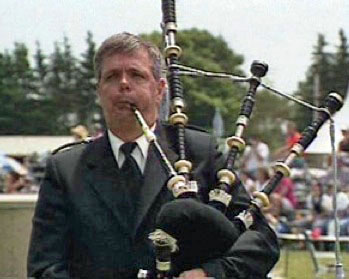Lodgings on a Cold Ground: Scott MacAulay’s final resting place
![Scott MacAulay competing with Clan MacFarlane at the 1983 Chicago Highland Games. [Photo Rowland Berthoff]](https://www.pipesdrums.com/storage/2020/09/MacAulay_Scott_Chicago1983_med.jpg)
Although he was synonymous with piping in southern Ontario and Prince Edward Island, his final resting place is at Dail Mòr Cemetery, Carloway, on the Isle of Lewis, where his mother and father were from before they emigrated to Hamilton, Ontario.
Six-feet-four-inches notwithstanding, Malcolm Kenneth Scott MacAulay was larger-than-life and a piper of the first order. He grew up under the tutelage of Sandy Keith and played in the Grade 1 Erskine Pipe Band of Hamilton, and spent more than one season living in Scotland playing with the Grade 1 Muirhead & Sons under the legendary Pipe-Major Bob Hardie.
Accomplished in track and field, MacAulay often would pick up prizes in the solo piping on the Scottish Highland games circuit and also participate in the athletic events. At a Muirhead’s practice after a games, Hardie reportedly asked how a group of his pipers got on at a games and was told, “We didn’t get anything, but Scott won the Marches and the high jump.”
MacAulay would join the Grade 1 Clan MacFarlane Pipe Band in the late 1970s, where he was a stalwart member while competing with great success in professional solo light music events around the Ontario circuit.
![Scott MacAulay's gravestone at Dail Mòr Cemetery, Carloway, Lewis. [Photo Colin MacLellan]](https://www.pipesdrums.com/storage/2020/09/MacAulay_Scott_grave_Lewis.jpg)
He discovered piobaireachd in the mid-1980s, receiving guidance from James McIntosh. Within a few years, he was gaining prizes in ceol mor in the professional grade around Ontario, and in 1985 he won the Silver Medal at the Northern Meeting at Inverness. At the same event, he won the Open Jig, which at the time still featured about 50 players from all grades streaming across the Eden Court Theatre stage performing one jig twice-through.
A composer of note, he published a collection of music. His jig, “Karen Nuttall,” is probably his most-played tune.
In 1990, MacAulay moved to Summerside, Prince Edward Island, where he took the job of founding Director of the College of Piping & Celtic Performing Arts. Under MacAulay’s leadership, the College went from strength to strength for the next 18 years. Following his death, James MacHattie took the role and seen the organization through to its current strong status.
Scott MacAulay had a unique ability to fill up a room with fun and laughter. A raconteur through and through, he loved a song, a joke and a party. Indeed, Neil Dickie’s classic hornpipe, “The Kitchenpiper,” is named for him.
It isn’t easy to imagine MacAulay ever resting, but he has a good place on his beloved Lewis.
Our thanks to Scott MacAulay’s friend of many years, Colin MacLellan, for the photo of the grave.
Related
 Scott MacAulay, 1956-2008
Scott MacAulay, 1956-2008
September 30, 2008
 Hundreds turn out for Scott MacAulay tribute
Hundreds turn out for Scott MacAulay tribute
November 30, 2008
![]() Sandy Keith, 1937-2012
Sandy Keith, 1937-2012
February 29, 2012

NO COMMENTS YET